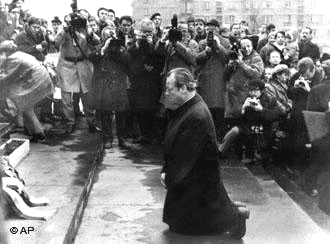
 |
|
|
#29 | ||
|
Member
How Do You Identify?:
Altocalciphilic Preferred Pronoun?:
Papa Smurf Relationship Status:
Curmudgeonous spinster Join Date: Nov 2009
Location: London (but from Belfast)
Posts: 678
Thanks: 471
Thanked 3,654 Times in 602 Posts
Rep Power: 21474853            |
Quote:
For example, someone might suggest that he or she is apologising on behalf of all Christians for the injustices that GLBT peoples have suffered over the years. However, that person is indicating that he or she speaks for an entire people or movement when clearly he or she does not. A personal apology is real - an apology from a person on behalf of a people or movement may have honourable intentions but it comes across, to me at least, as crass and arrogant. There are times when it is possible to apologise on behalf of a people. That's when the person apologising is in the (fortunate) position to be able to do so from both a personal and a corporate perspective i.e. as a bone fide representative of a people or society. Quote:
 This was an extremely poignant moment and went some way towards easing some of the multitude of pain that remained following World War Two. That's not to suggest that all Germans were responsible for the attrocities caused by the Nazis. However, it was right and proper that the German nation apologised for this. That said, it had to be the Head of State doing so, as Head of State but with personal emotion. A German individual cannot apologise on behalf of the German people / German nation anymore than I cannot apologise on behalf of the Northern Irish people for the attrocities that have been carried out by my people against the England nation over recent decades. Hope that makes sense. I realise that my spelling here is proper English (i.e. we don't use "z"s) not Americanised English and that's something I definitely won't be apologising for 
|
||
|
|

|
|
|